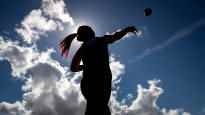The European Commission’s High Level Group on Sport has completed its first recommendations and action program on equality. The goal is to get more women into decision-making and address harassment.
15.3. 15:00 • Updated March 15 15:17
The European Commission has been working on new strategic recommendations and an action plan for equality in sport throughout the European Union.
The recommendations of the Commission’s High Level Group on Sport aim to increase the participation of women in key decision-making and coaching positions, to address harassment and violence against women and minorities in sport, and to increase the media visibility of women athletes.
Recommendations handed over to the European Commission’s Commissioner for Education, Youth, Sport and Culture on Tuesday Marya Gabrielille.
– The leadership of the sports movement must be committed to increasing equality in decision-making and preventing sexual harassment in sport. Finnish sports management must now work to increase women’s leadership, the diversity of sports and the participation of girls. In Finland, the share of women in the management of trust in sports organizations has remained at the same level for the past 15 years. It seems that it is easier to achieve Olympic gold in Finland than equality in sport, Heinilä says in a press release.
According to recent recommendations from a working group of the European Commission, half of women should be in trust and operational management in sport at all levels. In Finland, 16 per cent of the chairmen of the boards of sports federations are women and less than a third (28 per cent) of the board members of sports federations.
According to the working group, sports organizations can increase women’s leadership by limiting the number of positions of trust or requiring different genders in leadership positions.
– The Finnish Sports Federation (SUL) has boldly introduced quotas in its administration. Other sports organizations should follow suit. The glass roof is firmly in place in sports: there has never been a woman as the chairman or executive director of the Finnish Olympic Committee or the largest sports federations. Likewise, diversity as a whole is a major challenge. Attention should also be paid to women’s career development and recruitment, so that skilled women are not left behind in the recruitment processes and outside the management teams in operational management, Heinilä thinks.
The leadership of the sports movement plays a major role in eradicating sexual harassment
Suek 2020, the Finnish Sports Ethics Center according to a survey (switching to another service) almost one in three (32 per cent) women and almost one in five men (19 per cent) had experienced sexual harassment. Women had experienced significantly more sexual harassment (23 percent) than men (three percent). Young women and athletes from different minorities experienced the most harassment.
The working group’s recommendations emphasize that the commitment of sports management to ending violence and harassment at all levels of sport is a prerequisite for prevention.
According to the recommendations, Member States can prevent gender-based harassment and violence by setting up reporting channels and requiring an anti-violence plan to obtain funding. In Finland, such channels are the joint project of the Population Association and Finnish sports You are not alone and Suek’s ILMO service for reporting sports violations.
The Confederation of Women’s Organizations sees it as important that the above-mentioned services be continuously developed in order to be able to intervene in the structures and make the necessary repairs. According to the association, Finland should also consider requiring a plan to combat violence from sports organizations.
The press release states that the detailed recommendations of the European Commission’s working group have been drawn up in accordance with the principles of gender equality, women’s rights and intersectionality. Intersectionality means taking into account factors that together affect a person’s status and risk of discrimination, such as age, gender and gender identity, functional capacity, ethnic background and sexual orientation. The recommendations provide guidance to the European Commission, the Member States, national sports organizations and grassroots actors.
In addition to Heinilä, the European Commission’s High Level Group on Equality in Sport includes, among others, the chairman of the Irish Olympic Committee Sarah KeaneMember of the IOC and President of the International Triathlon Federation, Spanish Marisol CasadoFormer Chairman of the IOC Athletes’ Committee and Olympic Medalist in Fencing, German Claudia Bokel and a former professional tennis player and Olympic Olympic medalist, a Belgian Dominique Monami.
